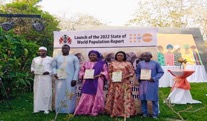
Ms. Ndeye Rose Sarr, made the above revelation on Friday at the launch of the 2022 State of World Population Report under the theme “seeing the unseen” which seeks to highlight the current position of global efforts on population issues and current condition of youth; girls and women.
The UNFPA boss added that, one in two pregnancies globally take place in the bodies of people who did not affirmatively choose parenthood; people who were not open to the prospect of having a child at that time and with that partner in those circumstances.
However, the UNFPA country rep said over 60% of unintended pregnancies is terminated and an estimated 45% of those are unsafe terminations, therefore contributing 5 to 13% of all maternal deaths.
“Unintended pregnancies have serious consequences especially for adolescent girls. Girls are more likely to drop out of school and have high risk of being stigmatised in their communities. Some are subjected to neglect and exclusion to social life”.
In addition to limited or lack of access to modern contraceptive methods, Ms. Ndeye Rose Sarr posited that it should be noted unintended pregnancies are influenced by various factors including sexual violence; poverty; stalled economic development; lack of sexual and reproductive health care among others.
Deputising for the vice president, the minister for Gender, Children and Social Welfare, Fatou Kinteh, said over the years, government has invested and focused a lot on contraception; the promotion of sexual and reproductive health and setting up of legal frameworks for the protection and empowerment of women of reproductive age and children.
She added that much has been done to that end, as the world faces ooming crisis of unintended pregnancies that now requires special and customised attention.
She said according to the SWOP 2022 in 2015-2019, the existence of 121 million unintended pregnancies each year represents about 48% of all pregnancies with 61% of those unintended pregnancies ending in abortion.
Hon. Kinteh in addition stated access to family planning services and information has been widely promoted over the years among women of reproductive age, while noting that even young girls are exposed to comprehensive health education to build their capacities to be able to make informed choices about their reproductive health and rights.
Furthermore, she pointed out that the current rate of unintended pregnancies represents a decline from various years, adding that between 1990 and 2019, the annual unintended pregnancy rate fell from 79-64 for every 1000 women aged 15-49.
Additionally, she said with the current rate of 64 unintended pregnancies per 1000 women, it means roughly 6% of the world’s women experience unintended pregnancies each year.




